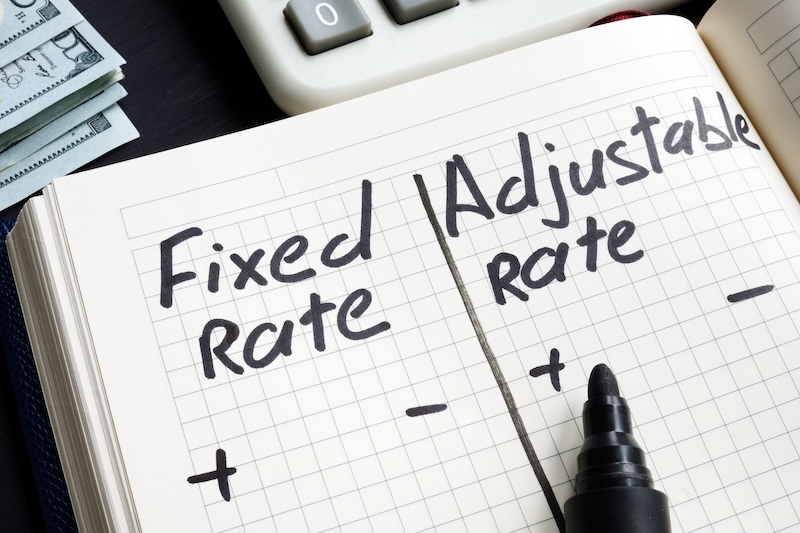When buying a home, one of the most critical decisions you’ll make is choosing the right mortgage. With so many options available, understanding the difference between fixed and adjustable-rate mortgages is essential. This decision impacts your monthly payments, long-term financial plans, and overall affordability of the home. Whether you’re using traditional financing or VA loan benefits, read on to discover how these mortgage rates work.
How Mortgage Rates Work
A mortgage rate is the interest charged by the lender on your loan. This rate affects how much you pay each month over the life of the loan. Rates fluctuate based on factors like the overall economy, inflation, and the Federal Reserve’s monetary policy. Your credit score, down payment, and loan type also affect your rate.
For homebuyers using VA loan benefits, the mortgage rate is still a crucial consideration. VA loans, backed by the U.S. Department of Veterans Affairs, often come with lower rates and more favorable terms than conventional loans, but the choice between fixed and adjustable rates remains relevant.
Why It’s Important to Understand Mortgage Rates
Understanding mortgage rates and how they work allows you to plan for the future. Knowing whether you have a fixed or adjustable rate impacts your financial security. A fixed-rate mortgage gives predictability, while an adjustable-rate mortgage can fluctuate over time. Choosing the right type for your financial situation can save or cost you thousands of dollars over the loan term.
For military families who move frequently due to PCS (Permanent Change of Station) orders, choosing the right mortgage structure is even more crucial. Whether you plan to stay in your home long-term or sell in a few years will influence whether a fixed or adjustable-rate mortgage is the best option for you.
Fixed-Rate Mortgages: Stability and Predictability
A fixed-rate mortgage offers stability. With this type of mortgage, your interest rate is locked in for the entire life of the loan, whether that’s 15, 20, or 30 years. Your monthly payments will remain the same throughout, which provides a predictable financial picture.
Benefits of Fixed-Rate Mortgages:
- Consistent Payments: You know exactly what your payment will be each month, making budgeting easier.
- Long-Term Security: If you plan to stay in your home for a long time, you won’t have to worry about interest rate increases.
- Protection from Market Fluctuations: Even if national interest rates rise, your rate remains the same.
Drawbacks of Fixed-Rate Mortgages:
- Higher Initial Interest Rates: Fixed-rate mortgages often have higher initial interest rates compared to adjustable-rate options.
- Less Flexibility: If rates drop significantly, you’re locked into your current rate unless you refinance, which can involve extra costs and paperwork.
Adjustable-Rate Mortgages: Flexibility and Risk
An adjustable-rate mortgage (ARM) starts with a lower fixed interest rate for an initial period, usually 3, 5, 7, or 10 years. After this period, the rate adjusts periodically based on market conditions. This means your payments can fluctuate over time.
Benefits of Adjustable-Rate Mortgages:
- Lower Initial Rates: ARMs generally start with a lower interest rate, which can make your initial payments more affordable.
- Good for Short-Term Homeowners: If you plan to move or sell your home before the rate adjusts, you can take advantage of the lower initial rate without the risk of future rate increases.
- Potential for Lower Overall Costs: If market rates stay low or decrease, you may end up paying less over time.
Drawbacks of Adjustable-Rate Mortgages:
- Uncertainty: Once the initial period ends, your rate can increase, leading to higher payments.
- Market Risk: If interest rates rise significantly, your mortgage payments could become unaffordable.
- Complex Terms: ARMs often come with complex structures, including caps and adjustment periods, which can be difficult to fully understand.
Choosing between a fixed and adjustable-rate mortgage depends on your financial situation, long-term plans, and risk tolerance. If you value stability and predictability, a fixed-rate mortgage is likely the better choice. However, if you plan to move within a few years or are comfortable with some uncertainty, an ARM may offer you short-term savings.


